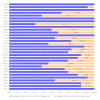Antimicrobial Use and Antimicrobial Resistance in Food-Producing Animals: Cross-Sectional Study on Knowledge, Attitudes, and Practices Among Veterinarians and Operators of Establishments in the Republic of Cyprus
- PMID: 40149062
- PMCID: PMC11939368
- DOI: 10.3390/antibiotics14030251
Antimicrobial Use and Antimicrobial Resistance in Food-Producing Animals: Cross-Sectional Study on Knowledge, Attitudes, and Practices Among Veterinarians and Operators of Establishments in the Republic of Cyprus
Abstract
Background: Current evidence suggests that more than half of all antimicrobials are used in the sector of food-producing animals, thus constituting a major risk factor for development and spread of antimicrobial resistance (AMR). Methods: This cross-sectional study assessed the knowledge, attitudes, and practices regarding antimicrobial resistance (AMR) and antimicrobial use (AMU) among veterinarians (n = 26) working with food-producing animals and operators (n = 165) of establishments that keep food-producing animals, across all districts of Cyprus between October and December 2024. Results: Most veterinarians demonstrated sufficient knowledge regarding AMR and AMU; however, certain knowledge gaps were identified. There was a general trend toward desired responses aimed at reducing AMU. Despite this, the level of responses advocating for restrictions on the use of specific priority antimicrobials and broad-spectrum antibacterials was unsatisfactory. Over half of veterinarians prescribed Category B substances. Furthermore, there was no significant association between the use of "restricted" antibiotics and veterinarians' level of knowledge nor between antibiotic use and the practice of microbiological culture and susceptibility testing. Among operators, positive attitudes were significant predictors of implementing of good practices. Additionally, operators who had contracts with a veterinarians were more likely to follow good practices. Conclusions: There is a need for further education on AMR in the veterinary sector in the Republic of Cyprus. Raising awareness among animal producers, is also crucial, along with enforcing a policy on antimicrobial use. Comprehensive governance involving all stakeholders must be implemented to address AMR more effectively.
Keywords: antibiotic use; antimicrobial resistance; food-producing animals; one health; operators; surveillance; veterinarians.
Conflict of interest statement
The authors declare no conflicts of interest.
Figures


Similar articles
-
Knowledge, Attitudes, and Common Practices of Livestock and Poultry Veterinary Practitioners Regarding the AMU and AMR in Bangladesh.Antibiotics (Basel). 2022 Jan 10;11(1):80. doi: 10.3390/antibiotics11010080. Antibiotics (Basel). 2022. PMID: 35052957 Free PMC article.
-
Knowledge, attitudes, and practices on antimicrobial use and antimicrobial resistance among poultry practitioner veterinarians.Front Vet Sci. 2024 Apr 9;11:1349088. doi: 10.3389/fvets.2024.1349088. eCollection 2024. Front Vet Sci. 2024. PMID: 38655534 Free PMC article.
-
Antimicrobial prescription practices and opinions regarding antimicrobial resistance among veterinarians in Palestine 2024.BMC Vet Res. 2025 May 19;21(1):356. doi: 10.1186/s12917-025-04826-5. BMC Vet Res. 2025. PMID: 40383773 Free PMC article.
-
Scoping review of approaches for improving antimicrobial stewardship in livestock farmers and veterinarians.Prev Vet Med. 2020 Jul;180:105025. doi: 10.1016/j.prevetmed.2020.105025. Epub 2020 May 11. Prev Vet Med. 2020. PMID: 32438205
-
Understanding farmers' and veterinarians' behavior in relation to antimicrobial use and resistance in dairy cattle: A systematic review.J Dairy Sci. 2021 Apr;104(4):4584-4603. doi: 10.3168/jds.2020-19614. Epub 2021 Feb 19. J Dairy Sci. 2021. PMID: 33612225
Cited by
-
Questionnaire-Based Survey Regarding the Rational Usage of Antimicrobial Agents in Food-Producing Animals in Romania.Vet Sci. 2025 Apr 26;12(5):408. doi: 10.3390/vetsci12050408. Vet Sci. 2025. PMID: 40431501 Free PMC article.
-
Antimicrobials in Livestock Farming and Resistance: Public Health Implications.Antibiotics (Basel). 2025 Jun 14;14(6):606. doi: 10.3390/antibiotics14060606. Antibiotics (Basel). 2025. PMID: 40558196 Free PMC article. Review.
References
-
- HERA Factsheet—HEALTH UNION: Identifying Top 3 Priority Health Threats—European Commission. [(accessed on 16 February 2025)]. Available online: https://health.ec.europa.eu/publications/hera-factsheet-health-union-ide....
-
- O’Neil J. Tackling Drug-Resistant Infections Globally: Final Report and Recommendations. The Review on Antimicrobial Resistance; London, UK: 2016.
-
- European Centre for Disease Prevention and Control (ECDC) Assessing the Health Burden of Infections with Antibiotic-Resistant Bacteria in the EU/EEA, 2016–2020. ECDC; Solna, Sweden: 2022.
-
- Organisation for Economic Co-operation and Development (OECD) Antimicrobial Resistance—Tackling the Burden in the European Union. European Centre for Disease Prevention and Control; Solna, Sweden: 2020. pp. 1–20.
LinkOut - more resources
Full Text Sources

